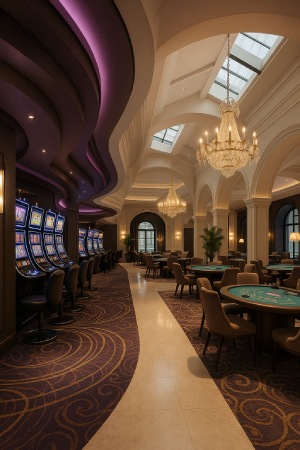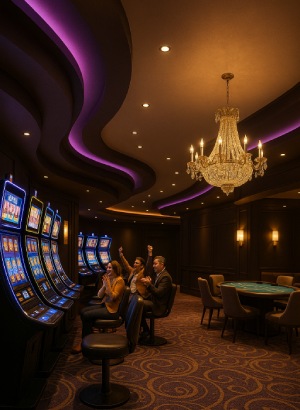Casino Design Layouts
The layout of a casino is not a random placement of tables and slot machines. It is instead a careful arrangement designed to maintain engagement and flow.

The Maze: Holding Players Inside
During much of the 20th century, casinos worked under the assumption of a maze layout, where rows of machines and the curving layout of pathways served to disorient guests. Exits were hard to find, clocks were nowhere near to be found, and windows were sparse. The ends were always obvious: to keep players unaware of the time and tempted for just one more opportunity to play.
Because of its ability to keep players engaged for long hours, though hardly ever used today, it remains influential.
'Dance Floor': Airiness and Comfort
The playground layout emerged in the 1990s. Architects began thinking of airy gaming halls, skylight areas, and lush designs instead of disorienting ones. Guests were encouraged to feel relaxed and pampered, assuming that feeling comfortable would induce them to stay longer and bet more.
Modern-day resorts still take their cue from this layout, wherein being elegant and stylish is as equally important as the gaming.
Rows vs. Clusters: The Social Impact
The older style of casinos, generally, had endless rows of machines; however, in many modern interiors, clusters of tables and slots are in favor. This setup beckons some psychology: people are instinctively drawn to groups. Seeing crowds reveling in a recent win, a player would want to be part of the same experience.
Because clusters encourage social interchange, this helps make gaming feel less like a lonely activity and more like a shared experience.
Sustainability in Casino Design
With the world turning more conscious toward the climate, this has become one of the main pillars supporting current-day casino projects. Consumers nowadays look at responsible behavior along with any other business logic, casinos being no exception.
Environmentally Responsible Materials and Energy Efficiency
New age casinos have been integrating green building materials into their construction, while also incorporating LED lighting, either for general illumination or for accent lighting, and highly efficient acoustic panels that reduce noise while saving energy. Even lighter decorative features like wall finishes or carpeting are considered with low environmental impact.
This not only reduces utility costs incurred while operating the property but also helps to build a favorable image in the eyes of the environmentally conscious visitors.
Biophilic Design: Bringing Nature Inside
The other trend increasingly prominent in its growth is biophilic design, with its innumerable variations of greenery, natural light, timber, and stone being placed inside. These attributes promote a calm atmosphere, lower stress levels, and incite guests to simply hang around for hours and hours. Hence, uplighting skylight, indoor gardens, and water features have now become popular for newly built hotels.
LEED Certification and Long-Term Effect
The casinos in Singapore and Macau have sought the LEED certification, branding themselves as environmental leaders. There is a long period ensuring operational savings and otherwise sustainable thrust in parallel with global trends in the hospitality industry.
Accessibility and Acceptance
Design is not only about style; it is about making sure that everyone can participate comfortably.
Mobility and Universal Design
Nowadays, casinos come with ramps rather than stairs, with wide aisles and easily accessible seating. These changes allow guests with mobility aids to flow effortlessly while allowing designers their flair.
Multi-Sensory Experiences
Accessibility also extends to sensory experiences: closed captioning for performances, auditory assistance devices, and varying lighting zones allow guests of differing abilities to attend. Casinos can be inclusive by offering both kinds of spaces-interactive and calming.
Psychology in Casino Interior Design
Space psychology remains one of the strongest tools in casino design.

Time Perception and Distraction
Casinos have long forbid clocks and windows so that players lose track of time. Even in the modern day, the time has always been hidden-away, though with-intervention by smartphones; now it poses several challenges. The principle still applies: a guest should stay engrossed in the game environment.
Smell Atmosphere of Winning
Designers want to create an atmosphere that feels like winnings are contagious. The layout of tables and groups of slots is so that instances of hits and wins are observable by others. When one person celebrates, people nearby are encouraged to try their luck.
Music, Scent, and Lighting
Background music, signature fragrances, and perfect lighting are all options in the psychological toolkit. Studies reveal that pleasing fragrances lead to increased spending; upbeat music maintains energy without interfering with the environment. Lighting accentuates the gaming zones while making other areas a bit more relaxed, which subtly alters guest behavior.
Modern Trends and Innovations
Contemporary casino interiors are becoming multi-use spaces combining gaming with luxury, wellness, and technology.
Technology Integration
Digital signage, video walls, and interactive kiosks continue their navigation and entertainment roles. Mobile applications have been developed to walk guests through large resorts while rewarding them with loyalty points and personalized promotions. Integration of VR and esports arenas is still in progress, which should attract young crowds.
Luxury and Experiential Design
Casinos today are competing not only among themselves but also with resorts, malls, and entertainment districts. As a result, such interior designs now include fine dining, a spa, retail outlets, and art installations. Guests want experiences to be immersive ones in which casino architecture, art, and entertainment converge.
Wellness and Smoke-Free Environment
Wellness made its way into the casino industry. Better air filtration, strict non-smoking rules, and wellness zones (think yoga studios or spas) make casinos more attractive once again, especially to the younger and health-conscious crowd.
✨ What makes Monte Carlo Casino stand out?
— ༒★𝔼𝕞𝕚𝕝𝕚𝕒𝕟𝕠★༒ 🇪🇦🇮🇹 (@Mart_Spain) August 9, 2025
🏛️ The magnificent architecture
🎨 Designed by Charles Garnier the mastermind behind the Paris Opera.
👑 From every corner, inside and out, it shines like a royal palace fit for kings and queens. pic.twitter.com/LHqkZZ1nVh